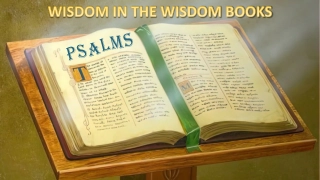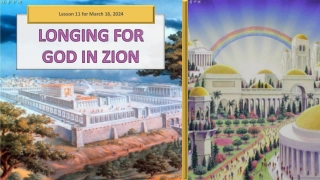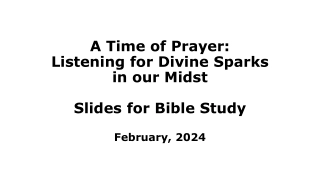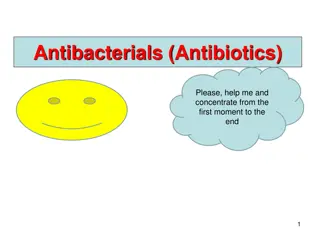Understanding the Challenge of Waiting Through the Psalms
Explore the intricate challenges associated with waiting as portrayed by the psalmists in the Hebrew scriptures. Delve into the profound meanings of six key verbs used to convey the complexities of waiting in the context of hope, endurance, and trust in the divine. Discover how these ancient words resonate with timeless truths and guidance for navigating periods of anticipation and patience.
Download Presentation
Please find below an Image/Link to download the presentation.
The content on the website is provided AS IS for your information and personal use only. It may not be sold, licensed, or shared on other websites without obtaining consent from the author. Download presentation by click this link. If you encounter any issues during the download, it is possible that the publisher has removed the file from their server.
Presentation Transcript
THE CHALLENGE OF WAITING The psalmists use six verbs or Hebrew words when they want to express the challenges related to waiting. These words cover a wide range of meanings: wait; long; bear; keep silence; wait; giving birth
Qawah wait, await, anticipate Qawah is the Hebrew verb most used to express the concept of hope. Of the twenty times qawah is used in the Psalter, the Lord is the object, or the one who is longed for: None of those who wait for you will be confounded (Ps. 25:3, see Ps. 69:6). ; Integrity and righteousness keep me, for I trust in you (Ps. 25:21); For in you, Lord, I hope; You will answer, Lord, my God (Ps. 38:15). As these verses amply show, our trust must always be in the Lord. The verb qawah can be used in a negative sense, as in awaiting the destruction of God's people at the hands of the enemy (Ps. 56:6; 119:95). The negative use of this word reminds us, as sinners, that the focus of our hope is often centered on the expectation of a bad outcome. To avoid this tendency, our expectations must come from a heart regenerated by the Holy Spirit.
Yahal wait, await, endure, yearn After qawah, yahal is the verbal root most used in the Old Testament to express hope. Of the 48 times it is used, 21 are found in the book of Psalms. Jahal is usually attached to qawah (Job 30:26; Ps. 39:8, 130:5; Prov. 10:28; 11:7; Isa. 51:5). In the psalter, God is the explicit object of the yahal hope ( Psalms 31:24; 33:22; 38:15; Psalms 39:7; 42:11; 69:3). Our Creator is worthy of all our trust. Our trust in his faithfulness and love is the foundation of all true religion, and the basis of the relationship between God and human beings. This relationship is based on his mercy and goodness, which he grants to those who trust in him (Ps. 33:18; 147:11). In Psalm 119, the object of hope is the Word of God (Ps. 119:43, 49, 74, 81, 114, 147). Furthermore, the words from the mouth of God, recorded in the Scriptures, are the only true foundation of the Christian faith. It is in the pages and promises of Scripture that the Christian can find the assurance of his hope and salvation. The enemy is well aware of this fact and has made the Bible the special target of his attacks, attempting to distract the believer from its truths or deceive him into believing that the Scriptures are a mere myth, invented by human beings. All the evidence we find in support of the Bible, its transforming power, its fulfilled prophecies, and its wonderful promises, should compel us to join the psalmist in affirming: I hope in his word (Ps. 130:5). Above all, our attention must be focused on the Scriptures as the source of all our hope.
Hakah wait, await, endure As with the verb yahal , the object of hakah is usually God (Isa. 8:17; 30:18; 64:3; Zeph. 3:8). Hakah is only used twice in the Psalter. The first use appears in Psalm 33:20, a song exalting the Creator and Sustainer of the world (Ps. 33:1-11). Psalm 33:12 is the key verse of this psalm, confirming that the Lord chose God's people. This choice is the foundation of the believer's trust in God. On the contrary, we cannot trust in the strength of weapons or warriors (Ps. 33:16, 17). The psalmist proclaims: We wait for the Lord; He is our help and our shield (Ps. 33:20). As human beings living in a secularized and materialistic culture, we tend to put our faith in money, in skills and diplomas, in science or in our country; but, as Christians, our trust must rest solely in the Lord. The other use of hakah, in Psalm 106, shows the lack of a patient and tolerant spirit. In Psalm 106:6, the author recalls God's miracles on behalf of his people during the Exodus and subsequent sojourn in the wilderness. But they soon forgot his works and did not wait [ hakah ] on his counsel (Ps. 106:13). Today we also face the same great temptation. Too easily, we forget what the Lord has done in our lives, making it difficult to wait for His promises.
Dumah Silence, rest Dumah refers to the silence of death ([Ps.] 94:17; 115:17). [...] Dumah refers to a silence or rest that reflects trust in God (Ps. 39:2[3]; 62:1[2]) or to a lack of silence that results from God's apparent inactivity ([Ps.] 22:2) (New International Dictionary of Old Testament Exegesis, entry on dumah , vol. 1, p. 912) . Psalm 62 uses this noun to refer to waiting in silence. The word is translated twice, as follows: Psalm 62:1: Only my soul waits in silence for God; my salvation comes from him (NASB). Psalm 62:5: My soul, wait in silence only for God, for from him comes my hope (NASB). Elsewhere in Scripture, wait implies keep silent. In times of waiting, the best way to endure and remain firm is to remain silent and meditate on the Word of God. That mindset helps us sustain ourselves and prepare for the endurance test we must go through before seeing our expectations met. Scripture comforts us in our waiting with these words: The vision waits for its appointed time; He hastens toward his end and will not fail. Even if it takes a while, wait for it. It will surely come, it will not tarry (Hab. 2:3).
Sabar wait, await, examine In the Old Testament, the verb sabar is used less frequently to refer to hope than the other words we have considered so far. The psalmist confidently states: Happy is he who has the help of the God of Jacob, who puts his hope [ sabar ] in the Lord his God (Ps. 146:5). Trusting in the Lord will bring happiness to the believer, even in the midst of trials. We have studied the reasons to trust God and worship him; The core of these reasons is hope. Interestingly, the psalmist uses sabar twice to express the action of waiting and, as such, exemplifies what waiting is all about. Psalms 104:27 and 145:15 describe animals waiting for the Creator to feed them: Everyone waits on you and everyone's eyes wait on you. As these images teach us, we must wait, without anguish or despair, for the heavenly blessings that God has promised us. By cultivating the patience and humble faith of a child, we will become stronger in our waiting. Our prayer life, as a result, will also be strengthened.
Yahal Work, writhe, shake, give birth Psalm 37:7 can be literally translated: Rest in the Lord and 'give birth' [ yahal ] for him. The implication is that the long-suffering resistance we must have as we wait for God's promises to be fulfilled is like the anguish of an expectant mother ready to give birth to her child. This period of suffering involves hard labor, intense pain, and tears. However, the outcome of the newborn's arrival compensates for the expectation and experience of suffering. Likewise, waiting for the Lord often involves temporary distress and suffering, but the result will be rich in blessings from the Lord.

















































